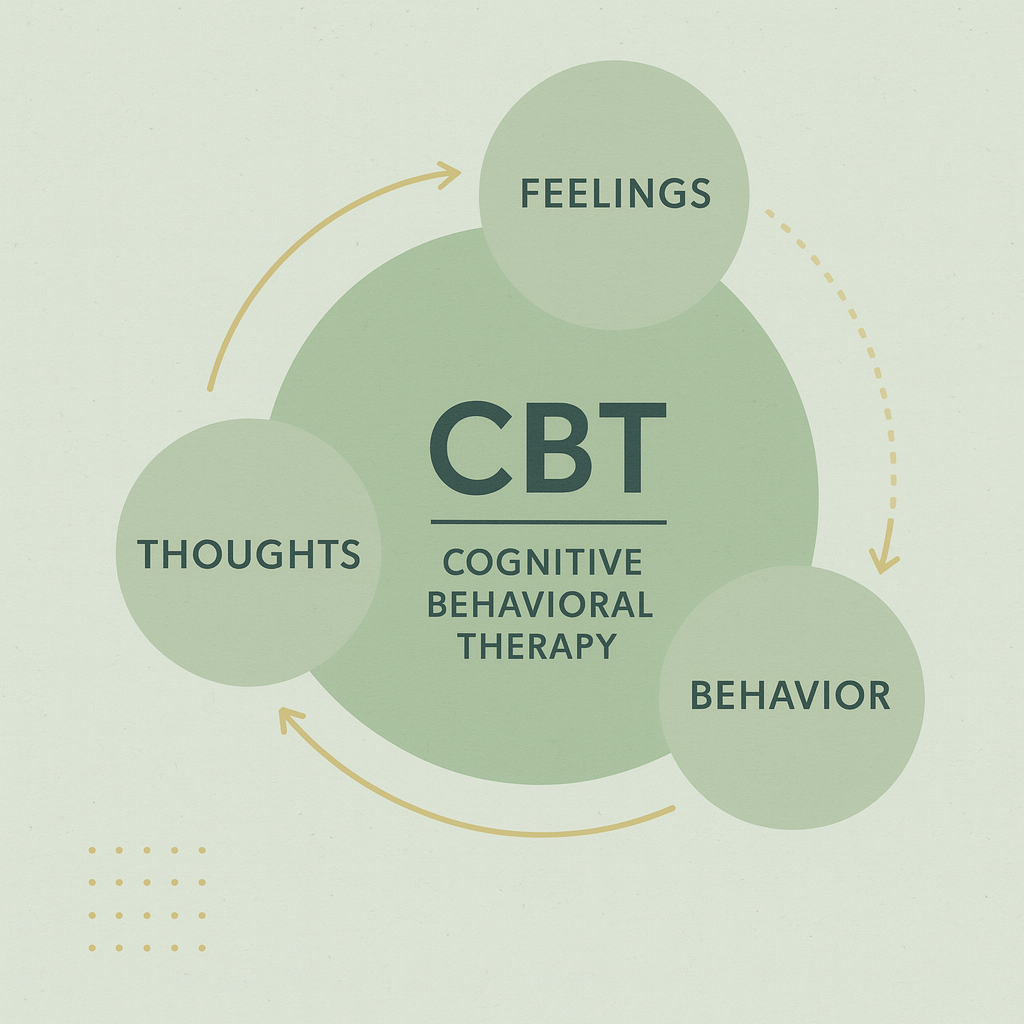
Personalized Individual Therapy in Kansas City for Anxiety, Stress, and Personal Growth
At Brookside Anxiety & Mental Health, our passion is providing psychotherapy that is compassionate and collaborative.
How Cognitive Behavioral Therapy (CBT) Helps Manage Anxiety and Overthinking
Cognitive Behavioral Therapy (CBT) is an empirically-supported treatment—meaning science shows it works—for many conditions including anxiety and obsessive compulsive spectrum disorders. It is a short-term, action-oriented, and collaborative approach focused on reducing current symptoms and making meaningful, lasting changes in your day-to-day life.
CBT is based on the idea that thoughts, feelings, and behaviors are inter-connected, and problematic patterns among them drive anxiety, depression, and other symptoms. CBT focuses on developing new ways of thinking and behaving that will break those unhelpful patterns.
CBT is a broad umbrella that encompasses a number of specific treatment techniques and interventions including: Exposure with Response Prevention (ERP), cognitive therapy, mindfulness-based interventions, Acceptance and Commitment Therapy (ACT), Dialectical Behavior Therapy (DBT), Habit Reversal Training (HRT), and behavioral activation, among others.
Anxiety, OCD, and Mental Health Conditions We Treat in Kansas City
Obsessive Compulsive Spectrum Disorders
Obsessive compulsive disorder (OCD)
Body dysmorphic disorder (BDD)
Trichotillomania (hair pulling)
Excoriation disorder (skin picking)
Other body focused repetitive behavior disorders (BFRBs)
Anxiety Disorders
Selective mutism
Social anxiety disorder
Separation anxiety disorder
Generalized anxiety disorder
Specific phobias
Panic disorder
Agoraphobia
Other Disorders
Post traumatic stress disorder (PTSD)
Tic disorders and Tourette’s Syndrome
Depressive disorders like major depression and dysthymia
Eating disorders like anorexia, bulimia, binge eating, and avoidant restrictive food intake disorder
Hoarding
A Personalized Therapy Experience Designed Around You
Your treatment plan will be individualized and tailored to your goals. At Brookside Anxiety & Mental Health, we take a personalized, evidence-based approach to therapy designed to help you reduce anxiety, improve well-being, and create lasting change. The therapy process begins with a comprehensive intake evaluation. This 90 minute session includes a clinical interview and structured questionnaires that provide a thorough understanding of your symptoms and an accurate diagnosis.
This information is used to develop an individualized treatment plan based on proven techniques and interventions, including Cognitive Behavioral Therapy (CBT) and other evidence-based methods. Each plan is designed to reduce your symptoms, support your mental health goals, and help you achieve meaningful progress.
Following the evaluation, active therapy sessions begin. The course of therapy usually starts with education to help you gain a clearer understanding of your symptoms and the underlying thought or behavior patterns contributing to them, as well as information about the recommended treatment modality. This phase is followed by learning practical skills to manage anxiety, stress, and overthinking while identifying helpful, lasting changes.
Most clients attend weekly individual therapy sessions for a period of time (most CBT treatments average 12–20 sessions, though that may vary depending on factors like symptom severity, life stressors, and personal goals). Sessions typically last 45–50 minutes, though extended sessions (60–85 minutes) are available for clients seeking a more in-depth, concierge-style therapy experience.
Once active treatment concludes, some people benefit from periodic booster sessions or mental health “check-ups” to maintain progress and continue personal growth.
How Individual Therapy Works
-
Step 1: Request
Complete the appointment form or give us a call.
-
Step 2: Schedule
We will schedule an initial consultation or intake evaluation.
-
Step 3: Evaluation
Visit us at our office or via telehealth for a structured intake evaluation.
-
Step 4: Feedback and Psychoeducation
Review diagnostic impressions, expectations, goals, and education on treatment modality.
-
Step 5: Psychotherapy
Start learning skills to live life to the fullest.
Therapy That Meets You Where You Are
Let’s get creative and do what is needed. It isn’t always easy to translate strategies from the therapy office to your daily life. Being out-of-network providers allows us the flexibility to do whatever is needed for our clients which can include sessions at home, school, or a grocery store. We can hold sessions while driving or via phone as needed.
Need-based Services
Brookside Anxiety & Mental Health is dedicated to serving our community and delivering necessary specialty care regardless of circumstances. As such, we consistently carry a portion of our caseloads at a discounted cost. Qualification is based on the client’s resources and clinical need.
For consideration or more information, please contact us.
“I have been a patient of my provider for about 6 years. She consistently follows up on the areas we’re working on, checks in during each visit, and offers new strategies when something isn’t effective. She doesn't give up on you.”
— BROOKSIDE ANXIETY & MENTAL HEALTH CLIENT




